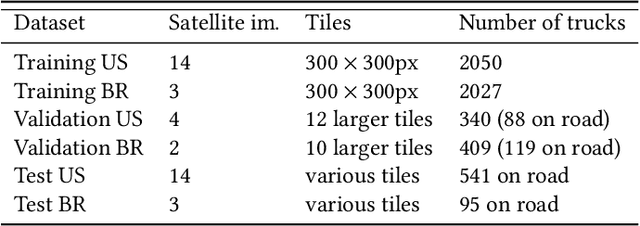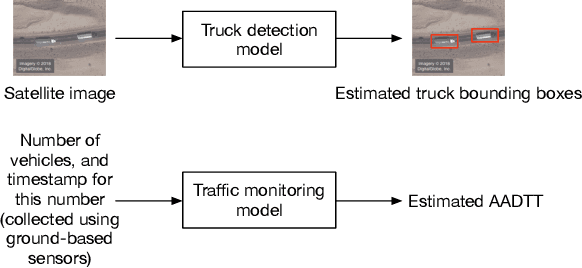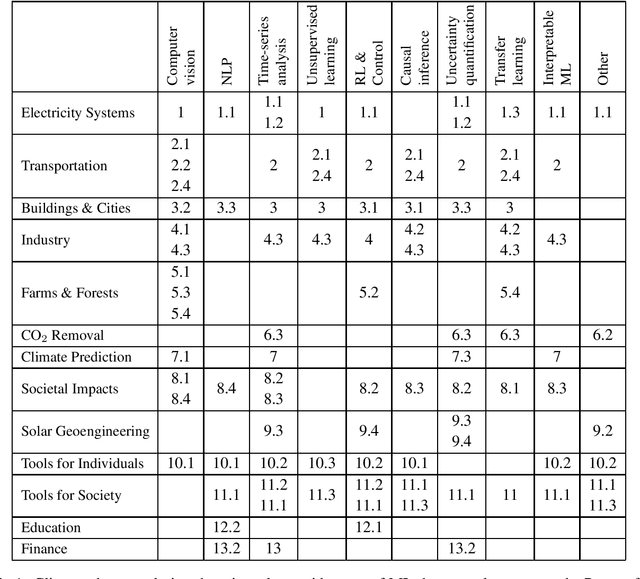Lynn H. Kaack
Spatio-Temporal Graph Neural Network for Urban Spaces: Interpolating Citywide Traffic Volume
May 07, 2025Abstract:Reliable street-level traffic volume data, covering multiple modes of transportation, helps urban planning by informing decisions on infrastructure improvements, traffic management, and public transportation. Yet, traffic sensors measuring traffic volume are typically scarcely located, due to their high deployment and maintenance costs. To address this, interpolation methods can estimate traffic volumes at unobserved locations using available data. Graph Neural Networks have shown strong performance in traffic volume forecasting, particularly on highways and major arterial networks. Applying them to urban settings, however, presents unique challenges: urban networks exhibit greater structural diversity, traffic volumes are highly overdispersed with many zeros, the best way to account for spatial dependencies remains unclear, and sensor coverage is often very sparse. We introduce the Graph Neural Network for Urban Interpolation (GNNUI), a novel urban traffic volume estimation approach. GNNUI employs a masking algorithm to learn interpolation, integrates node features to capture functional roles, and uses a loss function tailored to zero-inflated traffic distributions. In addition to the model, we introduce two new open, large-scale urban traffic volume benchmarks, covering different transportation modes: Strava cycling data from Berlin and New York City taxi data. GNNUI outperforms recent, some graph-based, interpolation methods across metrics (MAE, RMSE, true-zero rate, Kullback-Leibler divergence) and remains robust from 90% to 1% sensor coverage. On Strava, for instance, MAE rises only from 7.1 to 10.5, on Taxi from 23.0 to 40.4, demonstrating strong performance under extreme data scarcity, common in real-world urban settings. We also examine how graph connectivity choices influence model accuracy.
Flexibility of German gas-fired generation: evidence from clustering empirical operation
Apr 14, 2025



Abstract:A key input to energy models are assumptions about the flexibility of power generation units, i.e., how quickly and often they can start up. These assumptions are usually calibrated on the technical characteristics of the units, such as installed capacity or technology type. However, even if power generation units technically can dispatch flexibly, service obligations and market incentives may constrain their operation. Here, we cluster over 60% of German national gas generation (generation units of 100 MWp or above) based on their empirical flexibility. We process the hourly dispatch of sample units between 2019 and 2023 using a novel deep learning approach, that transforms time series into easy-to-cluster representations. We identify two clusters of peaker units and two clusters of non-peaker units, whose different empirical flexibility is quantified by cluster-level ramp rates. Non-peaker units, around half of the sample, are empirically less flexible than peakers, and make up for more than 83% of sample must-run generation. Regulatory changes addressing the low market responsiveness of non-peakers are needed to unlock their flexibility.
Truck Traffic Monitoring with Satellite Images
Jul 17, 2019



Abstract:The road freight sector is responsible for a large and growing share of greenhouse gas emissions, but reliable data on the amount of freight that is moved on roads in many parts of the world are scarce. Many low- and middle-income countries have limited ground-based traffic monitoring and freight surveying activities. In this proof of concept, we show that we can use an object detection network to count trucks in satellite images and predict average annual daily truck traffic from those counts. We describe a complete model, test the uncertainty of the estimation, and discuss the transfer to developing countries.
Tackling Climate Change with Machine Learning
Jun 10, 2019
Abstract:Climate change is one of the greatest challenges facing humanity, and we, as machine learning experts, may wonder how we can help. Here we describe how machine learning can be a powerful tool in reducing greenhouse gas emissions and helping society adapt to a changing climate. From smart grids to disaster management, we identify high impact problems where existing gaps can be filled by machine learning, in collaboration with other fields. Our recommendations encompass exciting research questions as well as promising business opportunities. We call on the machine learning community to join the global effort against climate change.
 Add to Chrome
Add to Chrome Add to Firefox
Add to Firefox Add to Edge
Add to Edge